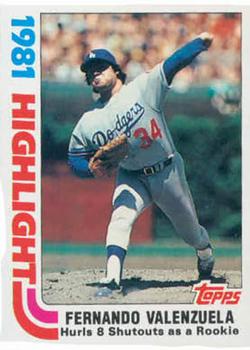Who Can It Be Now?
Fernando Valenzuela burst onto the scene in 1981 as a twenty-year-old rookie with the Dodgers by starting the year 8-0 with five shutouts and an ERA of 0.50. In his first eight starts, Valenzuela pitched at least nine innings in every single one of them. Fernandomania took over in Los Angeles in part due to the fantastic results and in part due to Fernando's unorthodox windup in which he looked skyward in the middle of his motion -- as his hands went over his head -- before he looked back at the plate and his catcher.
Despite the fact that the Dodgers played only 110 games in 1981, Valenzuela still started 25 games, completed 11 of them, threw 192-1/3 innings, and struck out 180 batters. In the post-season, he added another 40-2/3 innings. He won both the Rookie of the Year and Cy Young Awards, and helped lead the Dodgers to a World Series Championship over the Yankees.
In 2011, Valenzuela was ranked as the fifth-best Latino hurler (players had to be retired at that time) in baseball history, behind Dennis Martinez, Luis Tiant, Pedro Martinez, and Juan Marichal. The video accompanying the story on MLB.com shows Valenzuela's windup.
Trivial Pursuit
Valenzuela spoke basically no English when he first came up to the Dodgers. In 1981, this was a pretty big deal, it seems, since many of the stories about Valenzuela's phenomenal rookie season mention this fact. Then-Dodgers catcher Mike Scioscia learned Spanish and became Valenzuela's personal catcher thereafter.
Also a fun fact, seeing as this is opening day: Prior to the start of the 2014 season, Valenzuela was the last pitcher to make his first ever start in a season opener. That record is scheduled to end today, because, due to an injury to Yu Darvish, Tanner Scheppers will be making his first career start for the Texas Rangers against the Philadelphia Phillies.
In fairness to Fernando, Scheppers has a couple of seasons' worth of relief appearances in his background prior to today's game. Fernando only pitched in 10 relief appearances in September of 1980 (at age 19) prior to opening the 1981 season against the then-defending-NL West Champion Houston Astros.
A Few Minutes with Tony L.
In 1981, it was impossible to miss Fernando Valenzuela. Despite baseball's efforts to kill the game by cancelling a third of the year under the watch of then-Commissioner Bowie Kuhn, every major news outlet had stories about Valenzuela's incredible beginning to his career as a starter.
As pointed out in an excellent SABR article about the phenomenon -- and it was that, much more than anything since (other than seeing Nolan Ryan pitch in the early 1990s) in my opinion -- people came out in droves to see Valenzuela. To quote from the article:
Fans flocked to Dodgers games at home and on the road. Eleven of Fernando’s 12 starts at Dodger Stadium in 1981 were sellouts. On the road during his first two years, Valenzuela’s starts drew more than 13,000 more people than other Dodger starters. Prior to 1981, the Dodgers had only broken the 3 million mark in attendance twice. From 1982 to 1986, home attendance was over 3 million every season. The Dodgers broke the major league attendance record in 1982 with 3.6 million fans and slipped only slightly to 3.5 million in 1983.More than anyone, Valenzuela gave Los Angeles's Latino community a reason to care about el beisbol over futbol or other diversions. Fernando was a native Mexican who grew up incredibly poor, and that background was extremely important to drawing the Mexican-American diaspora in LA in to baseball. As the SABR article mentions, most Latino stars before Fernando were from the Caribbean -- guys like Puerto Rican Roberto Clemente and Dominican Juan Marichal.
Fernando opened up Mexico to baseball, and his legacy is apparent in the number of players signed from there since. Players such as Yovani Gallardo, Teddy Higuera, Dennys Reyes, Jorge de la Rosa, Joakim Soria, and many, many others were all born in Mexico and owe at least a small debt of gratitude to Fernando opening the eyes of the often blinkered MLB scouting community of the 1970s and 1980s to the possibility that players from places other than the Dominican might be able to play in the big leagues.


No comments:
Post a Comment